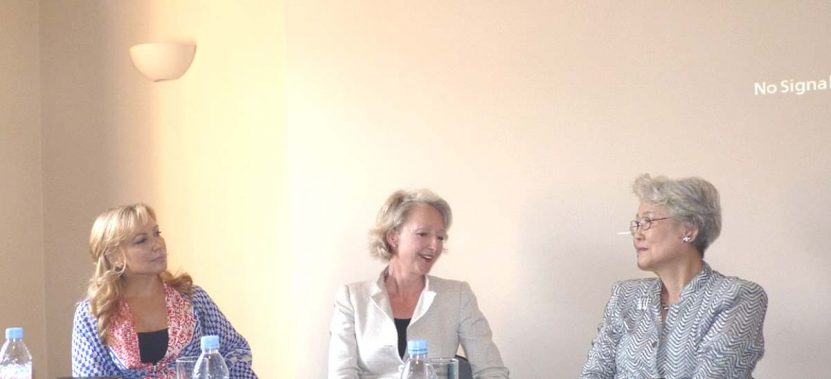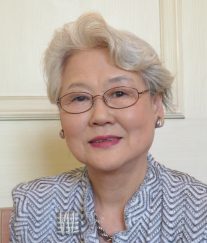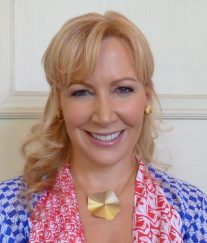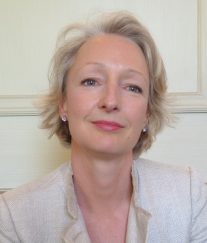 Seminar Series 2012
Seminar Series 2012Tuesday 22 May 2012
6:00pm – 7:45pm
Women and Leadership
Drinks reception from 8:45pm
Daiwa Foundation Japan House
Organised by the Daiwa Anglo-Japanese Foundation
The fourth seminar in our 2012 series Leadership: People and Power in the UK and Japan looked at Women and Leadership. Japan remains one of the OECD’s poorest performers on gender equality issues, despite numerous attempts over the years to improve the situation. Only 11.3% of Japanese Diet members are women (a proportion recently surpassed by South Korea, with 14.7%). A survey of listed companies by Toyo Keizai last year found that women accounted for just 1.4% of management positions. And what about the UK, which elected its first female Prime Minister over 30 years ago? Even here, men in leadership positions still far outnumber women, and the gender debate is very much alive. Do we need quotas for female representation at the highest levels? Our Japanese speaker was Dr Wakako Hironaka, one of the few women at the top level of Japanese politics, who became a State Minister almost 20 years ago, at a time when it was very difficult for women to succeed in this field. Our UK speaker was Suzi Digby OBE, Founder and Principal of The Voices Foundation, well-known as both a charity leader and a choral conductor. The seminar was chaired by Joanna Pitman, former Tokyo Bureau Chief of The Times.
Introducing the evening’s speakers and female leaders, one in the field of politics and the other in the sphere of education and the arts, Joanna Pitman, the chair, began by saying that many questions remain unanswered regarding gender equality, and that for the situation to improve, women must speak out.
Dr Wakako Hironaka’s take on women and leadership in Japan took the form of personal observations. She spoke of her experiences before, during and after the Second World War. She spent a quarter of a century growing up in Japan, a further quarter of a century as a housewife and student in the USA and a third quarter of a century back in Japan during which time she served as Member of the Japanese Diet particularly concerned with environmental and development issues.
Hironaka was born in Tokyo in 1934 to a father who was part of the newly emerging middle class and to a mother whose ambition had been to become an opera singer. They were disciplinarians. As the middle child, Hironaka was largely able to escape their attention.
She began primary school in war time and was often punished for bad behaviour at school. In her fourth year she was evacuated to the seaside resort of Atami where she missed home and always felt hungry. After the war she was relocated to a temple which had no running water or gas for cooking in a remote village in Iwate Prefecture.
Hironaka was surprised by the changed attitudes of the grown-ups in American-occupied Japan once the war was over. Teachers had begun teaching pupils about democracy and the American way of life, and the new Japanese constitution was largely influenced by the United States. Hironaka later realised that the Americans who had advised on the constitution were in some ways projecting their own hopes for gender and race equality which did not become a reality in the United States until as late as the 1960s during the Kennedy presidency.
The first general election after the Second World War and with a new constitution in place was held in April 1946. 79 female candidates were fielded and 39 were elected as members of the Lower House. The next election only saw 15 out of 85 women voted in and ever since only 10 women or so are elected every four years.
Hironaka went to college, aware of the difficulty for women to find jobs after graduation as, despite the constitution, they were expected to marry. On graduating she decided to go to the United States, curious to observe for herself the country which had fostered democracy and gender equality. She studied at Brandeis University, where unexpectedly, she met women who, like their Japanese counterparts, were also expected to marry. During the Eisenhower presidency the United States was very conservative.
Hironaka majored in anthropology and was taken by Betty Friedman’s 1963 The Feminine Mystique, which claimed that home is where women’s intelligence is being locked away, and which is widely credited with igniting the Feminist Movement in the United States.
As soon as her two children started attending school, and taking advantage of the fact that her husband was a professor, she returned to college and took courses in history and psychology amongst other subjects, and began translating books into Japanese such as Life After 40 and Ezra Vogel’s Japan as Number One.
As her children grew and she had more time to pursue her own interests, Hironaka founded the International Group for the Study of Women in Japan. She began interviewing politicians and visionaries including Sir Edward Heath, Professor James K Galbraith and Margaret Meade while at the same time also observing Japanese society.
Turning her attention to Japan she felt that children were studying too much and spending too much time at ‘juku’ (‘crammers’). It seemed that housewives in Japan were at home for much of the day and dedicated themselves to pushing their husbands and children.
Back in Japan, Hironaka was invited to run for the Diet by the Komei Party and won her seat. She found politics unexpectedly interesting and was particularly taken with three concerns: improving the living environment beyond clean air and water, fair trade on a global scale and development aid which as well as being transparent and environmental was not self-serving. During the short-lived Hosokawa government she served as Director-General of the Environment Agency (1993-94) and has continued her support for environmental programmes by taking on many domestic and international roles in this area.
The equal opportunities law was passed in Japan in 1985. While women are venturing into politics and other fields, 59% still feel they should stop working on giving birth. The lack of availability of child-care centres is one reason women find it hard to go back to work resulting in more working women also being single in Japan.
At the moment only 52 out of the 479 members of the Japanese Lower House are women while 44 our of 242 in the Upper House are women.
Japan remains a poor performer on gender equality issues. In order to correct this imbalance companies need to show a bit more flexibility especially in terms of working hours. A lot still needs to be done.
The next speaker, Suzi Digby, began by saying that she would talk about leadership and look at the challenges and rewards of women in leadership, common ground between the UK and Japan, her own trajectory, potential and real barriers faced as women, possible solutions, ways that the UK and Japan can learn from each other and reveal her tombstone mantra.
Beginning with the metaphor of gardens, which are so important in both the UK and Japan, Digby pointed out that gardens in Japan are aesthetically meticulous, full of philosophy and borrowed views and timeless. British gardens on the other hand evince random but controlled design, are seemingly uncontrived and display a naturalism reminiscent of landscape.
In terms of fashion, Digby said that Japanese wear immaculate costumes; their fashion is striking, timeless and instantly recognisable and yet Japan is a world leader in cutting edge designer clothes. In the UK people are constantly challenging tradition when it comes to fashion, though cling to tradition elsewhere.
The British are often portrayed as individualistic, empirical, understated, sarcastic and phlegmatic said Digby. The Japanese on the other hand are often regarded as harmonising, exclusive, possessors of an inherent secrecy, hierarchical, modest, humble and unlikely to challenge authority.
Both nations’ people display self-discipline, self-restraint and propriety.
Digby went on to talk about her own trajectory pointing out that she is primarily a musician interested in the power of music on the mind. She is a freelance conductor, an educator and a founder of four companies as well as spending four weeks a year in the United States as a professor.
She founded the Voices Foundation, a not-for-profit organisation which maintains that from birth it is important to start with the voice; Vocal Futures, another charity which looks at the disengagement of the young from music; Artworks which is not a charity and which works with senior management instilling values via music; and the Voice Chamber Choir, a voluntary organisation for singers mainly between 20 and 30 – it is a microcosm of society and results in social cohesion and fun.
Digby said that she is happy to break down barriers and promote herself though this sometimes results in journalists accusing her of being pushy. She feels that a barrier for women in the UK is that they tend to get stuck in middle management roles.
Barriers for Japanese women include embedded networks, hierarchy, the fact that progress is slow and that many women stick to their gender values of modesty and humility shying away from aggressive self-promotion. 73% of female managers believe there have been obstacles in the way compared to only 38% of men who believe this is the case.
Japanese women lack role models and networking opportunities and feel they suffer from stereotyping.
Searching for ways of breaking through this by looking at British solutions for Japan, Digby suggested more mentoring and improving property rights. She also had a list of things to do and avoid, largely informed through common mistakes of would-be-leaders.
Digby said one shouldn’t necessarily appoint people one likes but rather cleverer people. One shouldn’t make enemies, forget old friends, be bullied or bully, exploit or be exploited. On the other hand one should network like crazy, seek help, acknowledge that help, be patient for success, be loyal, trust colleagues, delegate and be prepared for sacrifice.
From Japan there are a host of qualities which can be learnt and many which were visible during in the aftermath of last year’s earthquake and tsunami. Using tsunami as an acronym Digby went on to list training, sacrifice, unwavering, noble, ability, media restraint and integrity as well as calm, dignity, grace, order, tenderness and conscience.
From the UK Japan can learn about the courage of one’s conviction and the need to challenge.
A good leader needs to enable colleagues and to possess empathy and trust. Ingredients that constitute a leader include surrounding oneself with people who are better than you, and displaying positivity with realism, courage rather than fearlessness, respect for others, patience, charisma with humility, self-belief without ego, loyalty, perseverance, obsessiveness and drive.
Quoting from As You Like It, Suzi Digby finished by saying that the mantra she would like to be remembered by is, ‘Sweet are the uses of adversity.’
The lively questions and comments which followed the talks included the fact that Dr Hironaka’s experience as an evacuee and the way she tried to remain outside her parents’ immediate attention may have helped shape the direction of her life, whether women will be in a position to chart new paths for themselves in post-earthquake and tsunami Japan and whether new roles in the voluntary sector will emerge; the importance of female role models as a means of inspiration, whether it is important for women to change the way they use language, the apparent dearth of female composers, the fact that structural changes and quotas may help redress the gender imbalance at management level, the fact that not all women want leadership and that men also need help in visualising women as leaders.
This event was supported by Japan Airlines.
About the contributors

Dr Wakako Hironaka
Dr Wakako Hironaka is a former Member of the House of Councillors (1986-2010) and a former Vice-Chair of the Democratic Party of Japan. Among her many roles, she has served as State Minister, Director-General of the Environment Agency (1993-94), Chair of the Committee on Fundamental National Policies, and Chair of the EU-Japan Parliamentary Group. Dr Hironaka has also been active internationally, as a Vice-Chair of Global Environmental Action, Chair of GLOBE Japan, and member of the World Commission on Forests and Sustainable Development, the Earth Charter Initiative, and International Science Advisory Board of UNESCO. She currently serves as Director-General of GEA, and as a Board Member of the Energy and Resources Institute, Earth Charter Commission and PA International Foundation. She was awarded the Grand Cordon of the Order of the Rising Sun by the Emperor Akihito in 2010.

Suzi Digby OBE (Lady Eatwell)
Suzi Digby OBE (Lady Eatwell) is an internationally renowned Choral Conductor and Music Educator. Born in Japan, Suzi lived internationally before settling in London/Cambridge. She has trailblazed the revival of singing in UK schools and the community over two decades. Suzi founded and runs four influential arts/education organisations: The Voices Foundation (the UK’s leading Music Education Charity); Voce Chamber Choir (one of London’s finest young Chamber Choirs); Vocal Futures (Nurturing young [16-22] audiences for Classical Music); and Artsworks (Leadership and ‘Accelerated Learning’ for Corporates). She is a Professor at the University of Southern California, where she is creating a Masters in Arts Leadership. As a conductor, Suzi’s 2011 debut with the Orchestra of the Age of Enlightenment (Vocal Futures’ Bach’s St Matthew Passion) was met with outstanding critical acclaim. Suzi is Trustee of Music in Country Churches, among other music and education charities. She is President of the Incorporated Society of Musicians and was Acting Music Director of Queens’ College, University of Cambridge. Amongst many TV appearances, she was judge in the BBC1 show, Last Choir Standing.

Joanna Pitman (chair)
Joanna Pitman was educated at Cambridge University where she read Japanese Studies. On graduating, she worked for a number of financial magazines in London before joining The Times. In 1989 she was appointed Tokyo Bureau Chief of The Times, a post she held for six years covering all news out of Japan and major stories in the region. Back in London, she became a writer on international affairs for The Times and did a series of major political interviews for the paper. Changing course, she spent ten years as an arts critic on The Times, and then when her children were older, she joined the strategic intelligence company, Hakluyt & Co. She is a trustee of Somerset House and of the Great Britain Sasakawa Foundation. She has written two books: On Blondes (2004) and The Raphael Trail (2006).
